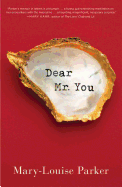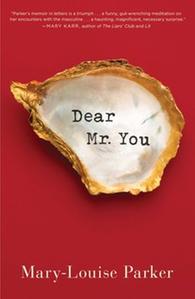
 In her inventive, unconventional memoir, Dear Mr. You, actress Mary-Louise Parker offers glimpses into her life via 34 letters written to and about significant men in her life, showing how masculine presences--fleeting, long-term and imagined--have influenced her, for better or worse.
In her inventive, unconventional memoir, Dear Mr. You, actress Mary-Louise Parker offers glimpses into her life via 34 letters written to and about significant men in her life, showing how masculine presences--fleeting, long-term and imagined--have influenced her, for better or worse.
The letters are wide-ranging in subject, form and tone. Most pay homage to family, as in "Dear Grandpa," which tells the story of Parker's grandfather and a creative act of love he undertook to brighten a son's dark days during World War II. In "Dear Daddy," Parker writes longingly of her father, his war experiences and how an injury sustained in battle changed his life, and Parker's as well.
Other letters are odes to--or denunciations of--lost loves, sexual exploits and long-ago intimacies. Parker comes to terms with a tormenting relationship with an abusive, insecure man and muses on the bittersweet gift of retrospect. In "Dear Blue," a peculiar, loincloth-wearing hippie haunts Parker at the co-op store where they work together. It is only years later that she admits, "I wanted sweetness and someone truthful but I was fussy about the form sweetness might take.... I want to say I'm sorry for hiding from you behind the coffee bins and whatever else I put in front of me, attempting to keep genuine kindness away."
Hostility suffuses "Dear Mr. Cabdriver," in which Parker, during a very bad day, verbally assaults a cabbie with poor navigation skills. A tug-of-war over Parker's newborn baby incites "Dear Orderly." An accountant takes Parker to task about her troubled, mismanaged finances, but then shows her unexpected compassion in one letter. And in another, a personality clash and power-struggle challenge Parker and an early acting instructor.
Tenderness and sensitivity gravitate to the fore in a letter about Parker's short-lived friendship with a man battling cancer. A much-beloved priest encourages Parker--and even her children--to question faith and religion. She writes an affectionate portrait about the two-way street of friendship, and humbly recalls meeting the biological uncle of her adopted, Ethiopian-born daughter. In "Dear Future Man Who Loves My Daughter," Parkers admiringly glances back at the protectiveness of her own brothers when she was growing up.
The men at the center of each letter often serve as mirrors, reflecting much about Parker and those who physically populate her world, as evidenced in one of the most moving letters of the collection, "Dear Oyster Picker," which is directed toward an anonymous worker who harvested the last meal Parker's father would indulge in this side of heaven.
Whether writing to NASA, poets, musicians, a goat facing castration, an ash-covered firefighter on 9/11 or doctors, Parker's prose is infused with a perfect balance of sarcasm, humor and poetic language. Her letters shine with candid, self-aware depth--unabashed in revealing the truth of her own nature and experiences. --Kathleen Gerard, blogger at Reading Between the Lines
Shelf Talker: Award-winning actress Mary-Louise Parker chronicles her life by writing letters to men who have influenced her.

